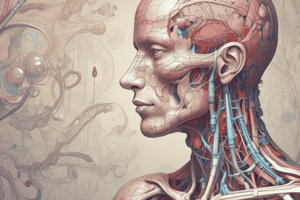Podcast
Questions and Answers
What is the primary function of the circulatory system?
What is the primary function of the circulatory system?
- To transport oxygen and nutrients to cells and remove waste products (correct)
- To bring oxygen into the body
- To break down food into nutrients
- To control and coordinate body functions
Which system is responsible for controlling involuntary actions, such as heartbeat and breathing?
Which system is responsible for controlling involuntary actions, such as heartbeat and breathing?
- Digestive system
- Circulatory system
- Respiratory system
- Nervous system (correct)
What is the main function of the respiratory system?
What is the main function of the respiratory system?
- To break down food into nutrients
- To provide support and protection for the body
- To transport oxygen and nutrients to cells
- To bring oxygen into the body and remove carbon dioxide (correct)
Which organs are responsible for exchanging oxygen and carbon dioxide in the lungs?
Which organs are responsible for exchanging oxygen and carbon dioxide in the lungs?
What is the main function of the digestive system?
What is the main function of the digestive system?
Which system is responsible for providing support, protection, and movement for the body?
Which system is responsible for providing support, protection, and movement for the body?
The process by which water is circulated between the Earth and the ______ is known as the hydrologic cycle.
The process by which water is circulated between the Earth and the ______ is known as the hydrologic cycle.
Water from the Earth's surface is heated by the ______ and turns into water vapor.
Water from the Earth's surface is heated by the ______ and turns into water vapor.
Water vapor cools and changes back into liquid water, forming ______.
Water vapor cools and changes back into liquid water, forming ______.
Precipitation that does not get absorbed into the ground flows over the surface as ______.
Precipitation that does not get absorbed into the ground flows over the surface as ______.
The process by which plants release water vapor into the air through their leaves is called ______.
The process by which plants release water vapor into the air through their leaves is called ______.
The water cycle supports life on Earth by providing water for ______, animals, and humans.
The water cycle supports life on Earth by providing water for ______, animals, and humans.
Flashcards are hidden until you start studying
Study Notes
Human Body Systems
Circulatory System
- Transports oxygen and nutrients to cells and removes waste products
- Main organs: heart, blood vessels (arteries, veins, capillaries)
- Functions:
- Pumping blood throughout the body (heart)
- Oxygen and nutrient delivery to cells (arteries and capillaries)
- Waste removal from cells (veins)
Respiratory System
- Brings oxygen into the body and removes carbon dioxide
- Main organs: lungs, trachea, bronchi, diaphragm
- Functions:
- Breathing in oxygen (inhalation)
- Breathing out carbon dioxide (exhalation)
- Exchange of oxygen and carbon dioxide in the lungs
Nervous System
- Controls and coordinates body functions
- Main organs: brain, spinal cord, nerves
- Functions:
- Receiving and interpreting sensory information (brain)
- Sending messages to muscles and glands (nerves)
- Controlling involuntary actions (e.g. heartbeat, breathing)
Digestive System
- Breaks down food into nutrients for energy and growth
- Main organs: mouth, esophagus, stomach, small intestine, large intestine
- Functions:
- Mechanical breakdown of food (mouth and stomach)
- Chemical breakdown of food (stomach and small intestine)
- Absorption of nutrients into the bloodstream (small intestine)
Skeletal System
- Provides support, protection, and movement for the body
- Main organs: bones, cartilages, ligaments
- Functions:
- Supporting the body's structure
- Protecting internal organs (e.g. ribcage, skull)
- Facilitating movement (e.g. joints, muscles)
Key Concepts
- Interdependence of body systems: each system works together to maintain overall health
- Homeostasis: the body's ability to maintain a stable internal environment despite changes in external conditions
Studying That Suits You
Use AI to generate personalized quizzes and flashcards to suit your learning preferences.




